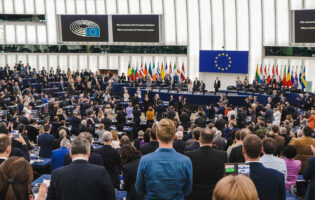
photoheuristic.info via Flickr
Corona Crisis: What Can Economic Policy Do?

Jörn Quitzau
Bergos AG
Joern Quitzau is a Geoeconomics Non-Resident Senior Fellow at AGI. He is Chief Economist at Bergos, a private bank based in Switzerland. He specializes in economic trend research and economic policy. Joern Quitzau hosts two Economics podcasts.
Prior to his position at Bergos, Joern Quitzau worked for Berenberg in Hamburg (2007-2024) and Deutsche Bank Research in Frankfurt (2000-2006) with a special focus on tax and fiscal policy.
Dr. Quitzau (PhD, University of Hamburg) was a Visiting Fellow at AGI in April 2014 and September 2022 and an American-German Situation Room Fellow in April 2018.
In his article on what economic policies can be pursued to mitigate the impacts of the coronavirus crisis, AGI Non-Resident Fellow Dr. Jörn Quitzau first establishes the “exceptional character” of the corona downturn, noting that it is distinctive from a global financial crisis given the simultaneous disturbance from both the supply and demand sides. He also emphasizes that major industrial nations experienced the downturn largely simultaneously, eliminating a regional balance in demand impulses. He suggests that GDP within the eurozone could shrink by more than 3.5 percent, and that the global economy is unlikely to recover by the second quarter of 2020, though it could start to pick up again from the third quarter onward. While it is impossible to say with certainty how much and for how long the coronavirus and the measures taken to mitigate its impact will harm the economy, there is much evidence to suggest that once the pandemic has abated, the economy can and will return to more normal conditions.
In the meantime, governments should set to work helping to bridge the liquidity gap in the shutdown phase, all the while remaining cognizant that traditional stimulus packages intended to strengthen purchasing power will do little for a society that is supposed to stay home. Dr. Quitzau praises governments and central banks for responding in the right way: by providing liquidity for those with little or no income, but who must still pay bills. Germany has eased qualifications for Kurzarbeit (short-time working), introduced tax liquidity support for companies, and provided liquidity assistance through KfW loans. Germany is able to pursue such measures in part because low interest rates and buoyant tax revenues have reduced its debt ratio from over 80 percent to below 60 percent of GDP. It is therefore well-positioned to finance an economic stimulus package, as are other eurozone nations benefitting from the €750 billion bond purchase program announced recently by the European Central Bank. As the coronavirus crisis develops further, the onus will rest on individual citizens, not just governments, to tolerate extreme reductions in public activity and changes to previously active lifestyles. The right motto for many, Dr. Quitzau says, is “let’s grit our teeth and bear it.”









